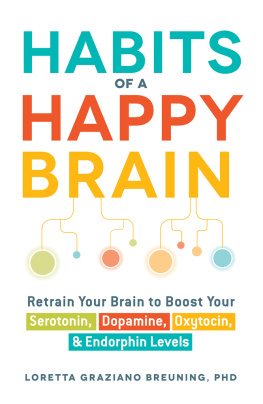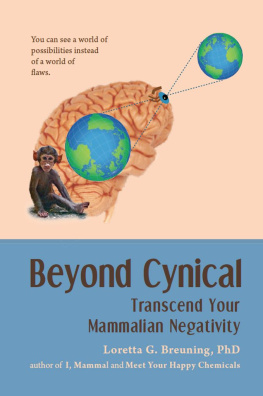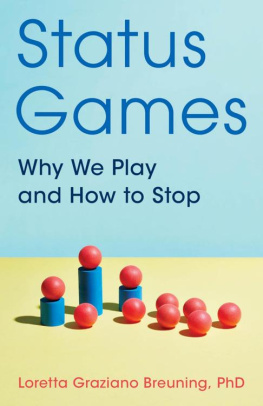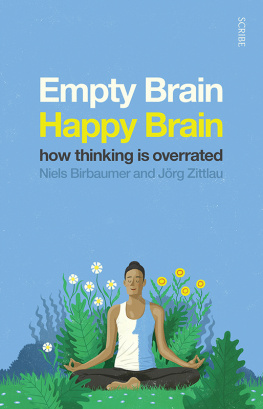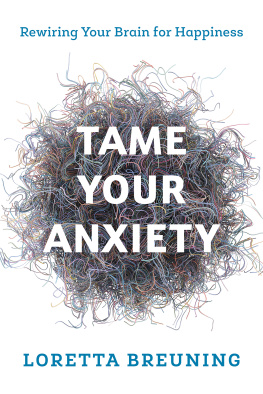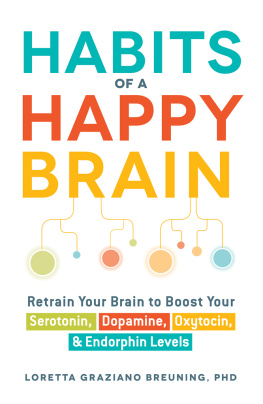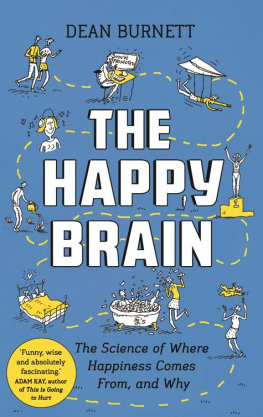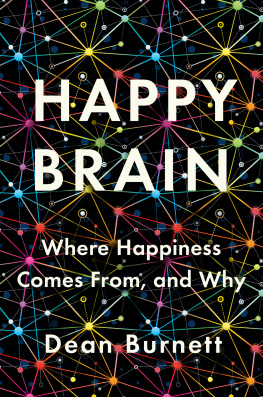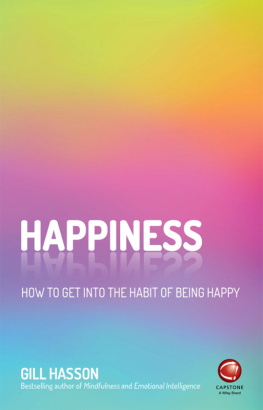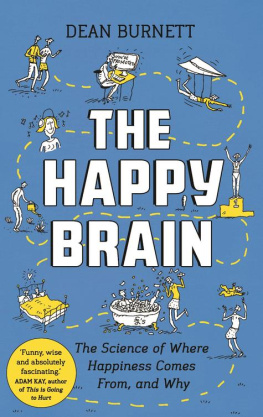Contents
Guide
HABITS
OF A
HAPPY
BRAIN
Retrain Your Brain to Boost Your Serotonin, Dopamine, Oxytocin, & Endorphin Levels
LORETTA GRAZIANO BREUNING, PHD

Avon, Massachusetts
for David Attenborough, who told the truth about the conflict in nature and for my wonderful husband, Bill
CONTENTS
INTRODUCTION
When you feel good, your brain is releasing dopamine, serotonin, oxytocin, or endorphin. You want more of these great feelings because your brain is designed to seek them. But you dont always get it, and thats natural too. Our brain doesnt release a happy chemical until it sees a way to meet a survival need, like food, safety, and social support. And then, you only get a quick spurt before your brain returns to neutral so its ready for the next survival opportunity. This is why you feel up and down. Its natures operating system!
Many people have habits that are bad for survival. How does that happen if our brain rewards behaviors that are good for survival? When a happy-chemical spurt is over, you feel like something is wrong. You look for a reliable way to feel good again, fast. Anything that worked before built a pathway in your brain. We all have such happy habits: from snacking to exercising, whether its spending or saving, partying or solitude, arguing or making up. But none of these habits can make you happy all the time because your brain doesnt work that way. Every happy-chemical spurt is quickly metabolized and you have to do more to get more. You can end up overdoing a happy habit to the point of unhappiness.
Wouldnt it be great if you could turn on your happy chemicals in new ways? Wouldnt it be nice to feel good while doing things that are actually good for you? You can, when you understand your mammal brain. Then youll know what turns on the happy chemicals in nature, and how your brain can substitute new habits for old ones. You can design a new happy habit and wire it into your neurons. This book helps you do that in forty-five days.
You dont need much time or money to build a new neural pathway; you need courage and focus, because you must repeat a new behavior for forty-five days whether or not it feels good.
Why doesnt it feel good to start a new habit? Your old habits are like well-paved highways in your brain. New behaviors are hard to activate because theyre just narrow trails in your jungle of neurons. Unknown trails feel dangerous and exhausting, so were tempted to stick to our familiar highways instead. But with courage and commitment, you will build a new highway, and on Day Forty-Six, it will feel so good that you will build another.
Warning: This book is about your brain, not about other peoples brains. If you are in the habit of blaming your neurochemical ups and downs on others, you will not find support here. But you neednt blame yourself, eitheryou can make peace with your mammalian neurochemistry instead of finding fault with it. This book shows you how.
Well explore the brain chemicals that make us happy and unhappy. Well see how they work in animals, and why they have a job to do. Then well see how the brain creates habits, and why bad ones are so difficult to break. Finally, well embark on a forty-five-day plan that explains how to choose a new behavior and how to find the courage and focus you need to repeat it without fail. This edition of the book contains a lot of new exercises and interactive features that help you take each step. You will like the resultsa happier, healthier you!
1 | YOUR INNER MAMMAL
Our Survival-Focused Brain
Your brain is inherited from people who survived. This may seem obvious, but when you look closer at the huge survival challenges of the past, it seems like a miracle that all of your direct ancestors kept their genes alive. You have inherited a brain that is focused on survival. You may not think you are focused on survival, but when you worry about being late for a meeting or eating the wrong food, your survival brain is at work. When you worry about being invited to a party or having a bad hair day, your survival brain sees the risk of social exclusion, which was a very real threat to your ancestors. Once youre safe from immediate threats like hunger, cold, and predators, your brain scans for other potential threats. Its not easy being a survivor!
Consciously, you know that bad hair is not a survival threat, but brains tuned to social opportunities made more copies of themselves. Natural selection built a brain that rewards you with a good feeling when you see an opportunity for your genes and alarms you with a bad feeling when you lose an opportunity. No conscious intent to spread your genes is necessary for a small social setback to trigger your natural alarm system.
These responses are rooted in your brains desire to survive, but theyre not hard-wired. We are not born to seek specific foods or avoid specific predators the way animals often are. We are born to wire ourselves from life experience. We start building that wiring from the moment of birth. Anything that made you feel good built pathways to your happy chemicals that tell you this is good for me. Whatever felt bad built pathways that say this is bad for me. By the time you were seven years old, your core circuits were built. Seven may seem young, since a seven-year-old has little insight into its long-term survival needs. But seven years is a long time for a creature in nature to be practically defenseless. This is why we end up with core neurochemical circuits that dont always match up with our survival needs.
In short, your brain has some quirks:
- It cares for the survival of your genes as urgently as it cares for your body.
- It wires itself from early experience, though thats an imperfect guide to adult survival.
This is why our neurochemical ups and downs can be so hard to make sense of.
How Do Chemicals Make Us Happy?
The feeling we call happiness comes from four special brain chemicals: dopamine, endorphin, oxytocin, and serotonin. These happy chemicals turn on when your brain sees something good for your survival. Then they turn off, so theyre ready to activate again when something good crosses your path.
Each happy chemical triggers a different good feeling:
- Dopamine produces the joy of finding things that meet your needsthe Eureka! I got it! feeling.
- Endorphin produces oblivion that masks painoften called euphoria.
- Oxytocin produces the feeling of being safe with othersnow called bonding.
- Serotonin produces the feeling of being respected by otherspride.
I dont define happiness in those terms, you may say. Thats because neurochemicals work without words. But you can easily see how strong these motivations are in others. And research illuminates these impulses in animals. As for yourself, your verbal inner voice may seem like your whole thought process until you know the chemistry of your inner mammal.
FOUR HAPPY CHEMICALS
Dopamine: the joy of finding what you seek
Endorphin: the oblivion that masks pain
Oxytocin: the comfort of social alliances
Serotonin: the security of social importance
How Do Happy Chemicals Work?
Happy chemicals are controlled by tiny brain structures that all mammals have in common: the hippocampus, amygdala, pituitary, hypothalamus, and other parts collectively known as the limbic system. The human limbic system is surrounded by a huge cortex. Your limbic system and cortex are always working together to keep you alive and keep your DNA alive. Each has its special job:

